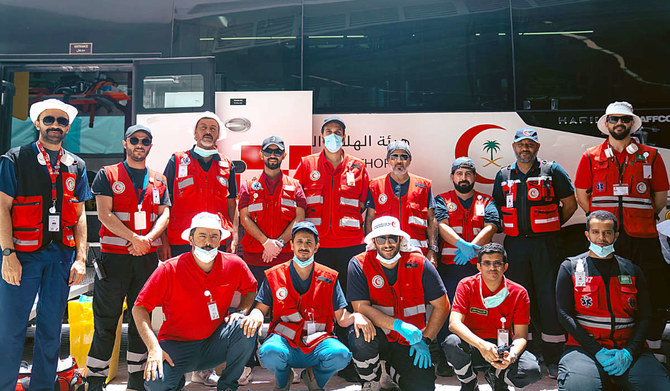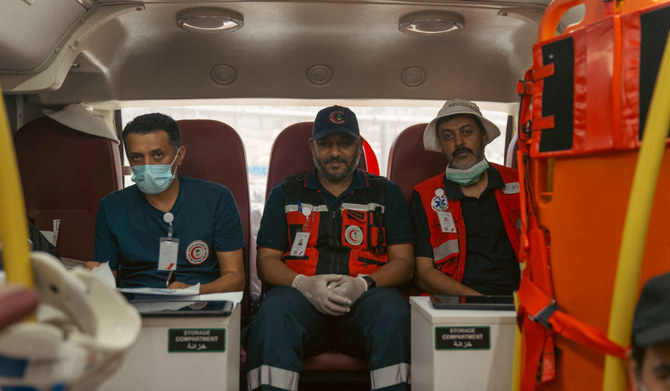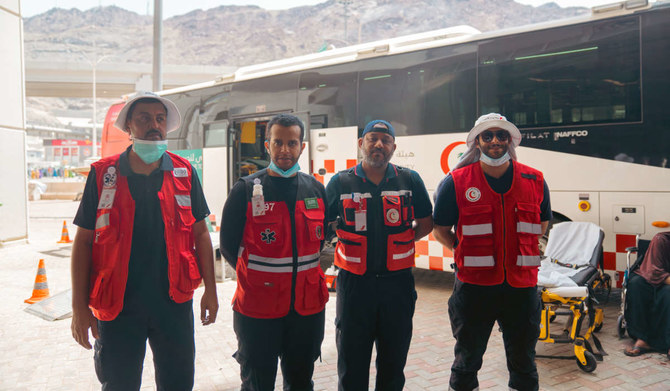JAMARAT: The dedicated team from the Saudi Red Crescent Authority — comprising doctors, paramedics, and medical specialists — stands prepared in the intense summer heat, armed with its medical equipment. Its personnel are ready to address any medical issues that pilgrims may encounter during their Hajj journey.
Mohammed Tarraf, the authority’s paramedic team leader, told Arab News: “I am very happy to be able to help the people in Hajj, and I am very proud to (have) the chance to help them.”
Tarraf, an experienced paramedic, has been serving during Hajj for three years. Utilizing his wealth of experience, he takes charge of a team of 14 individuals during each shift in Jamarat.

The Tuwaiq medical bus, a state-of-the-art facility equipped with 10 medical beds, has been utilized during Hajj to treat pilgrims experiencing heatstroke and other ailments. (AN photos by Abdulrahman Bin Shalhoubh)
Tarraf said it was important for him and his team to be present during Hajj. Their priority is to deliver top-notch medical care to the pilgrims, ensuring their well-being throughout the journey.
He quoted a line in the Qur’an to refer to his passion for saving the lives of pilgrims, saying: “And whoever saves a life, it is as though he had saved the lives of all mankind.”
The Saudi Red Crescent Authority team is honored at serving the pilgrims’ pivotal Islamic pilgrimage to the holy city of Makkah this year.
HIGHLIGHT
Equipped with advanced equipment and a specialized medical bus, the team works tirelessly in rotating shifts across the holy sites, ensuring the well-being of the pilgrims and upholding the spirit of the Hajj.
With the lifting of COVID-19 restrictions, this year’s Hajj season has witnessed a significant increase in the number of pilgrims. It is the largest attendance since 2019, with over 1.8 million pilgrims in the sacred city of Makkah to partake in the pilgrimage.
According to a recent statistic on its Twitter page, as of the 10th day of Dul Hijjah on Wednesday, the authority had received a total of 9,531 calls.
It said that 293 of those had come from within the Grand Mosque; 2,125 from Makkah; and 7,113 from sacred sites such as Arafat, Muzdalifah, Mina, and Jamarat.
According to the authority, within Arafat and Muzdalifah there were 27 ambulatory centers, 286 specialized teams, and more than 560 health practitioner volunteers ready to treat pilgrims.
The professionals of the Saudi Red Crescent Authority have been tirelessly working in rotating 12-hour shifts across various areas of the sacred sites.
Their efforts align with the movement of pilgrims as they progress through the different stages of their pilgrimage.
Tarraf said: “There are other teams arriving during the mornings and the nights.”
He explained that his colleagues had undergone specialized training to equip them with the necessary skills and knowledge to handle any potential medical emergencies.
The head paramedic allowed Arab News to inspect the authority’s Tuwaiq medical bus, which is a state-of-the-art facility equipped with 10 medical beds specifically designed to help in the treatment of victims during situations of “massive or multiple casualties.”
The bus has been used during Hajj to help pilgrims suffering from heatstroke, along with other complaints.
Tarraf told Arab News: “We saw many patients during Hajj, including some with abdominal pain, heatstroke, and general body weakness.
“(Our duty) is to provide first aid for the patient, and if the patient needs any medications or any interventions, we have doctors here and specialists for that.”
One of the doctors working with Tarraf’s team was Dr. Mohammed Al-Zubair.
Focusing on the bus, Al-Zubair said: “We have lots of equipment. One item is an amazing device called Lifepak 15 that can monitor vital signs like pulse, oxygen saturation, and blood pressure.
“The device can also support patients with bradycardia, tachycardia, and arrhythmia.
“It is an amazing device and we use it to help patients and pilgrims.”




























